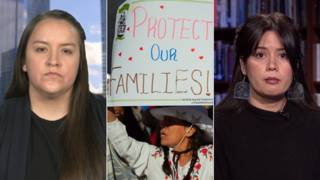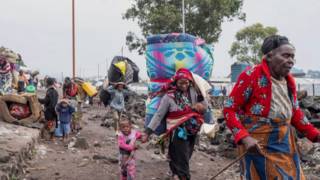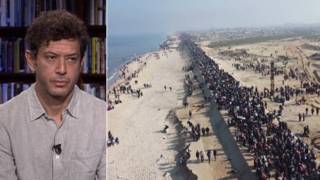HeadlinesNovember 09, 2010
U.S. Defends Right to Assassinate U.S. Citizens
The Obama administration argued Monday that the White House should have unreviewable authority to target and assassinate American citizens anywhere in the world if they pose a threat to the United States. The argument was made in federal court in response to a lawsuit filed by the American Civil Liberties Union and the Center for Constitutional Rights. The groups are representing Nasser al-Awlaki, who brought a lawsuit in connection with the government’s decision to authorize the targeted killing of his son, Anwar al-Awlaki, a U.S.-born Muslim cleric now living in Yemen. Jameel Jaffer of the ACLU said, “If the Constitution means anything, it surely means that the president does not have unreviewable authority to summarily execute any American whom he concludes is an enemy of the state.”
Move to Repeal DADT Stalling in Senate
In news from Capitol Hill, momentum appears to be growing for Congress to put off a vote to repeal the “Don’t Ask, Don’t Tell” policy that bars gays and lesbians from openly serving in the armed forces. Democrat Carl Levin, the chair of the Senate Armed Forces Committee, and Republican Senator John McCain have begun discussing a possible plan to strip the provision from the annual Defense authorization bill. Gay rights groups say the next few weeks are critical because the Republicans will gain control of the House in January. Earlier this week, Defense Secretary Robert Gates said he would like to see the Senate vote to authorize the repeal before the end of the year.
Connecticut Couple Sues to Overturn Defense of Marriage Act
Meanwhile, a Connecticut couple are filing a federal lawsuit today in an effort to strike down the Defense of Marriage Act, the 1996 law that prohibits the federal government from recognizing marriages of same-sex couples.
Commission: Cost Cutting Had No Role in BP Spill
The White House oil spill commission said on Monday it had found no evidence to support accusations that the largest offshore oil spill in U.S. history happened because BP and its partners cut corners to save money. The commission outlined a number of human errors and oversights that may have led to the disaster, but Fred Bartlit, the commission’s chief counsel, said cost cutting by BP was not to blame.
Fred Bartlit: “People have said people traded safety for dollars. We’ve studied the hell out of this. We welcome anybody that gives us something we’ve missed, but we don’t see a person or three people sitting there at a table considering safety and cost and giving up safety for cost. We have not seen that, and you have to be sure you understand that.”
The oil spill commission’s findings have been questioned by some outside observers. Yale University professor Charles Perrow said the investigation overlooked BP’s track record of disasters that have come after cost cutting. Perrow told the Associated Press, “There’s a long history of dollars versus safety at this organization.” Perrow cited BP’s 2005 Texas City oil refinery explosion in which federal officials cited a culture of cost cutting at the expense of safety. In 2006, BP’s lack of leak detection caused a massive pipeline spill, the largest on Alaska’s North Slope to date.
Netanyahu Speech Disrupted in New Orleans
Israeli Prime Minister Benjamin Netanyahu spoke in New Orleans on Monday before the Jewish Federation General Assembly. His address was repeatedly interrupted by young Jewish activists from the Young Leadership Institute of Jewish Voice for Peace.
Benjamin Netanyahu: “I’m going to talk about delegitimizing Israel, but they really have the wrong address.”
Activist: “The occupation delegitimizes Israel!”
Israel Plans for More Settlements
While Benjamin Netanyahu was touring the United States, the Israeli government unveiled plans to build more settlements in defiance of the international community. The latest plans call for more than 1,000 homes in East Jerusalem and 800 homes in the West Bank settlement of Ariel.
Netanyahu and Gates Weigh in on Iran
Benjamin Netanyahu has also used his U.S. trip to push the Obama administration to consider carrying out a military strike against Iran.
Benjamin Netanyahu: “The only time that Iran suspended its nuclear program was for a brief period during 2003, when the regime believed it faced a credible threat of military action against it. And the simple paradox is this: if the international community, led by the United States, hopes to stop Iran’s nuclear program without resorting to military action, it will have to convince Iran that it is prepared to take such action. ”
Meanwhile, Defense Secretary Robert Gates has rejected Israel’s claim that military force is the only way to deter Iran.
Robert Gates: “That said, we are convinced that non-military actions, including most significantly the most recent UN Security Council resolution and the individual countries’ approval of even more rigorous sanctions, including, I might say, Australia, is bringing pressure to bear on the Iranian government that is getting their attention. We know that they are concerned about the impact of the sanctions. The sanctions are biting more deeply than they anticipated. And we are working very hard at this.”
U.S. Offers to Drop Sudan from List of Terrorist Nations
In news from Africa, the Obama administration is offering to drop Sudan from its list of state sponsors of terrorism as early as next July if Khartoum ensures two key referendums take place on schedule in January. Sudan’s two parallel referendums could see southern Sudan secede to become Africa’s newest state and decide whether the disputed oil-rich territory of Abyei joins the north or the south.
Lori Berenson Released on Parole
In news from Peru, the American activist Lori Berenson was released on parole Monday after serving nearly 15 years in prison. She left the prison along with her young son Salvador. Berenson did not speak to reporters, but in a message posted on their website Berenson’s parents said they expect the state prosecutor to appeal the decision to release her. Berenson was convicted in 1996 by hooded Peruvian military judges of collaborating with the rebel group MRTA.
Anti-Nuke Protests Continue in Germany
Germany saw another day of mass civil disobedience on Monday as anti-nuclear activists attempted to block a rail shipment of nuclear waste. Thousands of activists sat down on the train tracks. Some chained themselves to the tracks while others lowered themselves from bridges on ropes. After the waste was transferred to a group of trucks, Greenpeace activists used a vehicle concealed as a beer truck to block the semi trucks from delivering their nuclear cargo to its final destination, an abandoned salt mine. When the nuclear waste finally arrived at its destination, the project was 92 hours behind schedule due to the protests.
Tobias Riedl, Greenpeace activist: “The Greenpeace activists are demonstrating against the irresponsible nuclear policy of Chancellor Angela Merkel. The extension of the lifespan of nuclear plants will mean almost 5,000 tons of nuclear waste for us for which there is absolutely no solution.”
Federal Court Holds Hearing on Mumia Abu-Jamal Sentencing
A federal court in Philadelphia is scheduled to hold a hearing today on the death sentence imposed on Mumia Abu-Jamal, the imprisoned journalist and former Black Panther. For decades, Abu-Jamal has argued that racism by the trial judge and prosecutors led to his 1982 conviction of killing a white police officer. Representing Abu-Jamal will be Judith Ritter, a law professor at Widener University. Last week, Abu-Jamal’s longtime attorney Robert Bryan stepped down.
Hedge Fund Manager Escapes Felony Charges Thanks to His Job
A wealthy hedge fund manager in Colorado has avoided facing felony charges for a hit-and-run accident because the local district attorney felt the charge could impact his high-paying job. Martin Erzinger, a fund manager at Smith Barney, allegedly ran over a cyclist with his Mercedes and then fled the scene. The cyclist suffered spinal cord injuries and bleeding from his brain. To the shock of cycling advocates, the local prosecutor, Mark Hurlbert, decided to charge Erzinger only with misdemeanors. Hurlbert said, “Felony convictions have some pretty serious job implications for someone in Mr. Erzinger’s profession, and that entered into it.”
Bush: Waterboarding Was Legal “Because the Lawyers Said It Was”
And in his first major interview since leaving office, former President George Bush has defended the Iraq invasion and admitted he approved the waterboarding of prisoners. Bush spoke to NBC as part of a promotional campaign around his memoir Decision Points, which hits bookstores today. Part of last night’s interview with NBC’s Matt Lauer focused on waterboarding.
Matt Lauer: “Why is waterboarding legal, in your opinion?”
President Bush: “Because the lawyers said it was legal, said it did not fall within the Anti-Torture Act. I’m not a lawyer. And — but you got to trust the judgment of people around you. And I do.”
Lauer: “You say it’s legal, and the lawyers told me.”
Bush: “Yeah… First of all, we used this technique on three people. Captured a lot of people and used it on three. We gained valuable information to protect the country, and it was the right thing to do, as far as I’m concerned.”
Lauer: “So, if it’s legal, President Bush, then if an American is taken into custody in a foreign country, not necessarily a uniformed American” —
Bush: “Look, I’m not going to debate the issue, Matt. I really” —
Lauer: “I’m just asking. Would it be OK for a foreign country to waterboard an American citizen?”
Bush: “It’s — all I ask is that people read the book. And they can reach the same conclusion if they would have made the same decision I made or not.”
Lauer: “You’d make the same decision again today?”
Bush: “Yeah, I would.”
Bush: Kanye West’s Remark Was “Disgusting Moment, Pure and Simple”
NBC’s Matt Lauer also asked President Bush about Hurricane Katrina.
Lauer: “About a week after the storm hit, NBC aired a telethon.”
Bush: “Yes.”
Lauer: “Asking for help for the victims of Katrina. We had celebrities coming in to ask for money, and I remember it vividly because I hosted it. And at one part of the evening, I introduced Kanye West. Were you watching?”
Bush: “No.”
Lauer: “Do you remember what he said?”
Bush: “Yes, I do.”
Kanye West: “George Bush doesn’t care about black people.”
Bush: “Called me a racist.”
Lauer: “Well, what he said was, 'George Bush doesn't care about black people.’”
Bush: “That’s [inaudible] ’he’s a racist.’ I didn’t appreciate it then. I don’t appreciate it now. It’s one thing to say, you know, 'I don't appreciate the way he’s handled his business.’ It’s another thing to say, 'this man's a racist.’ I resent it. It’s not true. And it was one of the most disgusting moments of my presidency.”
Lauer: “This from the book: 'I faced a lot of criticism as president. I didn't like hearing people claim that I lied about Iraq’s weapons of mass destruction or cut taxes to benefit the rich. But the suggestion that I was racist because of the response to Katrina represented an all-time low.’”
Bush: “Yeah, still feel that way as you read those words. Felt them when I heard them. Felt them when I wrote them. And I felt them when I’m listening to them.”
Lauer: “You say you told Laura at the time it was the worst moment of your presidency.”
Bush: “Yes.”
Lauer: “I wonder if some people are going to read that, and they might give you some heat for that. And the reason is this.”
Bush: “I don’t care.”
Lauer: “Well, here’s the reason. You’re not saying that the worst moment in your presidency was watching the misery in Louisiana. You’re saying it was when someone insulted you because of that.”
Bush: “No. And I also make it clear that the misery in Louisiana affected me deeply, as well. There’s a lot of tough moments in the book, and it is a disgusting moment, pure and simple.”
President Bush speaking last night on NBC. In his new memoir, Bush also writes that he was “shocked” when he discovered Iraq had no weapons of mass destruction. He writes, “No one was more shocked or angry than I was when we didn’t find the weapons. I had a sickening feeling every time I thought about it. I still do.”
Most popular
- 1
- 2
- 3
- 4
Non-commercial news needs your support
Please do your part today.











Media Options